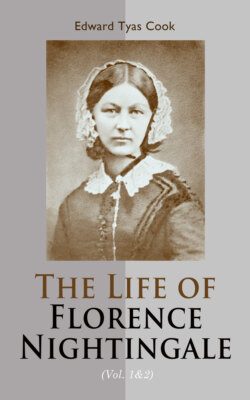Читать книгу The Life of Florence Nightingale (Vol. 1&2) - Edward Tyas Cook - Страница 40
На сайте Литреса книга снята с продажи.
III
ОглавлениеIt was not a sacrifice which cost her little. If, as some may hold, she was not in love, yet she confessed to herself many of a lover's pangs, and there were moments when, as she met her admirer again, or as she thought of him, she was half inclined to repent of her choice of the single life. And the sacrifice, moreover, was of an immediate satisfaction to an ideal which after all she might never be able to realize. The legends of the saints tell of many virgins and martyrs who have crucified the flesh and sacrificed worldly happiness for the love of Christ. But when the sacrifice was made, the love which seemed to them far better was already theirs. In the ears of St. Agnes the Divine Voice had sounded with sweet assurance, and she had tasted of the milk and honey of His lips. St. Dorothea was already espoused in a garden where celestial fruits and roses that never fade surrounded her. And to Florence Nightingale also happiness was to be given, filling all her life for some years, so that she “sought no better heaven”; but at the time when she made her choice, and renounced all else to follow her ideal, the way before her was still dark and uncertain. She was conscious of a call, but she had no assurance of appointed work. To have entered into a marriage which gave no sure promise of her ideal, would have been, she felt, the suicide of a soul; yet, when she was called to choose between the two paths, her present life was starvation.
Perhaps it was the price which she had paid for her ideal that led to what, in later years, some considered a certain hardness in her. When once a woman had devoted her life to the work of nursing, Miss Nightingale had little sympathy with any turning back. She seemed sometimes in such cases to regard marriage as the unpardonable sin.
But another and a loftier train of thought was prompted by her experience. At the end of one of her meditations upon marriage, and her refusal of it, I find these significant words: “I must strive after a better life for woman.” She did not mean a better life than marriage; she meant also a life that should make the conditions of marriage better. In the world in which she lived, daughters, she wrote, “can only have a choice among those people whom their parents like, and who like their parents well enough to come to their house.” One may doubt whether in the mid-Victorian or in any age, young men paid calls only because they liked the parents; but unquestionably restriction in the employments of women involves also limitation in the opportunities for choice in marriage. And at the same time the lack of interest and variety in the lives of girls at home makes many of them inclined to marriage as a mere means of escape. By throwing open new spheres of usefulness to women, Miss Nightingale hoped at one and the same time to improve the lot of those who were marked out to be wives, and to find satisfaction for those marked out for the single life.
